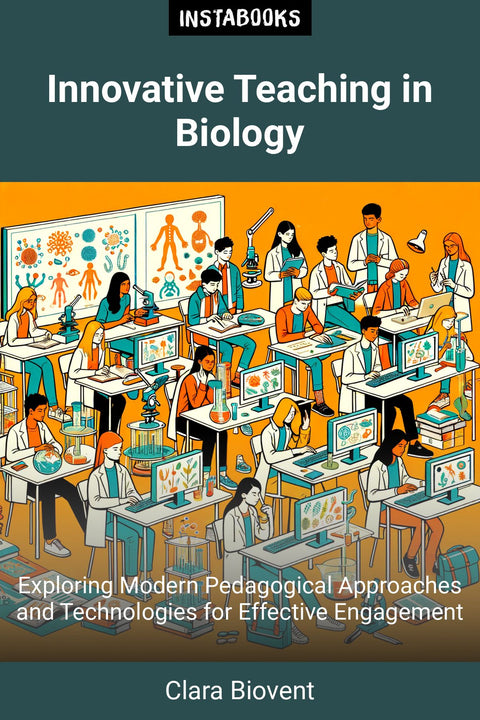
Innovative Teaching in Biology
Exploring Modern Pedagogical Approaches and Technologies for Effective Engagement
Included:
✓ 200+ Page AI-Generated Book
✓ ePub eBook File — read on Kindle & Apple Books
✓ PDF Print File (Easy Printing)
✓ Word DOCX File (Easy Editing)
✓ Hi-Res Print-Ready Book Cover (No Logo Watermark)
✓ Full Commercial Use Rights — keep 100% of royalties
✓ Publish under your own Author Name
✓ Sell on Amazon KDP, IngramSpark, Lulu, Blurb & Gumroad to millions of readers worldwide
Unlock the Secrets of Modern Biology Teaching
Discover the transformative power of innovative pedagogical approaches in the realm of biological sciences. Innovative Teaching in Biology dives deep into contemporary strategies that focus on student-centered, inquiry-based learning, empowering educators to engage their students in critical thinking and real-world applications.
Rethinking Curriculum Development
This book emphasizes the significance of designing curricula that harness phenomena- and problem-based learning units, integrating various disciplines that challenge students to think like scientists and engineers. This unique approach not only promotes equitable learning environments but also connects students with compelling scientific issues.
The Role of Educational Technology
In our rapidly evolving educational landscape, the integration of advanced educational technologies has become essential. This book explores transformative tools like interactive visuals, virtual labs, and simulations, which enhance hands-on experiences and illustrate complex biological processes effectively. As aspiring biologists link their learning to potential STEM careers, this resource empowers them with the skills needed to navigate a technology-driven educational environment.
Creating Inclusive Classrooms
Uncover effective teaching strategies that foster an inclusive, equitable classroom. Learn how to structure classroom discussions, encourage active participation through methods like think-pair-share, and appreciate diverse modes of biological thinking. This book provides practical guidance for educators aiming to create a supportive space for all students to thrive.
Preparing Future Educators
This insightful resource addresses the pressing need for training graduate students and emerging biology faculty in pedagogical practices. It advocates for systematic integration of teaching development programs tailored to the life sciences, ensuring future instructors are equipped with the skills and knowledge to enhance science education at the university level.
By the end of this book, readers will grasp the full spectrum of modern pedagogical approaches in biological sciences and be inspired to implement these insights in their classrooms, significantly improving student engagement and learning outcomes.
Table of Contents
1. Introduction to Modern Pedagogy in Biological Sciences- Defining Modern Pedagogy
- Importance of Student Engagement
- Historical Context and Evolution of Teaching Practices
2. Student-Centered Learning Approaches
- Understanding Student-Centered Learning
- Techniques to Foster Engagement
- Implementing Choices and Voice in Learning
3. Inquiry-Based Learning Techniques
- Core Principles of Inquiry-Based Learning
- Designing Effective Inquiry Tasks
- Assessment Strategies for Inquiry-Based Results
4. Project-Based Learning in Biology
- Integrating Projects into the Curriculum
- Collaborative Skills and Teamwork
- Evaluating Project-Based Learning Outcomes
5. Curriculum Development Strategies
- Phenomena-Based Learning Units
- Incorporating Interdisciplinary Approaches
- Aligning Curriculum with Standards and Competencies
6. Utilizing Educational Technology
- Overview of Modern Educational Tools
- Virtual Labs and Their Applications
- Best Practices for Successful Implementation
7. Creating Inclusive Classrooms
- Valuing Diverse Perspectives in Learning
- Developing Equitable Participation Strategies
- Building a Supportive Community for All Learners
8. Active Learning Strategies
- What is Active Learning?
- Incorporating Gamification in Teaching
- Structuring Collaborative Learning Environments
9. Engaging Students in Scientific Argumentation
- Foundations of Scientific Argumentation
- Facilitating Discussions in the Classroom
- Assessing Argumentation Skills in Students
10. Fostering Critical Thinking in Biology Education
- Strategies for Enhancing Critical Thinking
- Encouraging Questioning and Exploration
- Integrating Evaluation of Sources and Evidence
11. Training Future Educators in Pedagogy
- Importance of Pedagogical Training
- Developing Teaching Skills for Graduate Students
- Creating Effective Professional Development Programs
12. Conclusion: The Future of Biological Teaching
- Emerging Trends in Biology Education
- Advocating for Systematic Changes
- Inspiring a New Generation of Biologists
Target Audience
This book is intended for educators, curriculum developers, and graduate students in biological sciences who are looking to enhance their teaching practices through modern pedagogical approaches.
Key Takeaways
- Implement student-centered and inquiry-based learning methods to enhance engagement.
- Design curricula that incorporate phenomena- and problem-based units across disciplines.
- Utilize educational technology effectively to create interactive and virtual learning experiences.
- Establish inclusive classroom environments that foster active participation from all students.
- Prepare future educators with essential pedagogical skills to improve science education.
